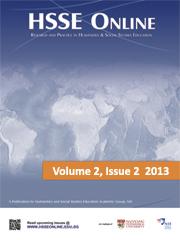Past Issues

Guest Editorial
Welcome to the new issue of HSSE Online!
The Humanities curriculum in Singapore has, with the launch of the new History and Geography syllabi, embarked on a new direction focused on inquiry in the classroom. In this issue focused on history and history education, we turn the spotlight on history as a discipline and the teaching of history in classrooms.
History is not just the study of the human past; it is the rigorous analysis and interpretation of the past. Not only does history involve investigation and inquiry, it also requires an active historical imagination to enable the historian to use all forms of evidence to better understand the past. The challenge for all historians (as well as history teachers and students) is to make historical sense out of the evidence at their disposal to explain change and continuity over time. Of course not everyone interprets evidence in the same way as aptly demonstrated by Farish Noor’s discussion of the “Colony versus Protectorate” debate. While national histories taught in schools may be the foundation upon which nation-states are built, the fact remains that history, as a discipline, remains the most politically contested discursive terrain among the humanities.
With its emphasis on perspective and context, the teaching of history in schools offers many challenges and an exciting adventure. Moving students beyond the study of “dates and facts” into the process of inquiring into the past has become an important goal for history educators. Such work should help students consider the past from different vantage points and better understand the immense complexities of the present. History teachers are today vastly helped by the rich array of materials available for use in history classrooms, such as historical documents, photographs and even film. In this issue, Jeremy Stoddard offers a model of how film can be used in the history classroom to engage students in historical inquiry, help them learn about perspective, interpretation, and historical concepts, as well as to develop empathy. In so doing, films about history are no longer just visual cues or windows into the past, but serve as tools by which students can conduct further inquiry through raising questions and challenging pre-existing beliefs or understandings about particular historical events.
Such moves towards getting students involved in historical inquiry, however, must also take into consideration students’ preconceptions about the disciplinary nature of the subject. In his commentary on the inquiry-based approach to learning history, Suhaimi Afandi makes the case for a pedagogy that considers students’ prior ideas about history and the need for teachers to consistently engage those ideas. He argues that developing students’ disciplinary understandings about history would require teachers to pay attention to the kinds of ideas their students bring into the classroom.
The three papers that follow suggest, in their own ways, the notion of teacher agency and the influence this will have on the development of students’ understandings in history. First, Syazwani Amrun’s study about the ways her secondary school students thought about significant representations of Singapore’s past demonstrated the importance of uncovering students’ preconceptions as a means for teachers to help clarify students’ pre-existing ideas and make their learning more engaging and personal. Next, in his analytical study of past GCE ‘O’ Level History examination papers, Colin Emerson reflects on the changing scope of history assessment that accompanies the new history syllabus, and envisages the likelihood of students doing well through a teaching strategy that favors the engagement of students’ conceptual understandings. Finally, Omar Basri shares his experience in implementing the Flipped Classroom model, a technology-based instruction that serves to engage and further enhance students’ classroom learning in history.
We hope you will find this issue of the HSSE Online useful for your research and professional learning and that some of the ideas here are helpful in developing deeper understandings about the nature of our craft.
Ivy Maria Lim
Suhaimi Afandi
Guest Editors, HSSE Online
November 2013
Using Film in Historical Inquiry: As Medium, as Evidence, for Empathy
Jeremy Stoddard (College of William & Mary, USA) Keywords History Junior College Inquiry Concept Film Prespectives Though often portrayed as a clichéd example of poor history
The New Inquiry-based Approach: What It Means for the Teaching and Learning of History in Singapore Schools
Suhaimi Afandi (National Institute of Education, Singapore) Keywords History Secondary School Inquiry Teaching Introduction Secondary Humanities teachers in Singapore are well-acquainted with recent developments and changes
“No One Icon”: Secondary Students’ Judgments of Significant Representations of Singapore
Syazwani Binte Amrun (Raffles Girls’ School) Keywords History Junior College Singapore Representation Significance Concept This study was designed to explore how students in a secondary school
